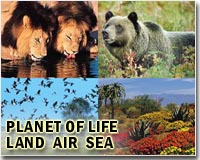| . |  |
. |
Davis, Calif. (UPI) Apr 27, 2011 Two groups of small fish, one from the Caribbean and one in Mexico, exhibit some of the fastest rates of evolution known in any organism, U.S. researchers say. Scientists at the University of California, Davis, say most of the 50 species of pupfish found from Massachusetts to Venezuela are much the same in looks and behavior, except for fish in the two places studied, a university release said Wednesday. Most of the species "look the same and they act the same," eating detritus and algae off rocks, UC Davis researcher Chip Martin said. However, Martin found one of the three pupfish species in shallow, salty lakes on San Salvador island in the Bahamas lives by biting the scales off other fish, while another eats small snails and clam shrimp. No other pupfish is known to eat scales, Martin said. Among pupfish originally from the Yucatan area, one eats other fish and another feeds on plankton, and both have evolved changes to their jaws to match their specialized diets. In constructing an evolutionary map for the species, Martin said, he found the San Salvador Island and Yucatan show explosive rates of evolution, changing as much as 130 times faster than other pupfish. It's not clear why the pupfish in the two locations are evolving so rapidly, so Martin is expanding his research by taking lab-bred fish, including hybrids, back to the lakes to see whether they thrive. He hopes to see which fish succeed out of a spectrum of hybrids, he said.
Share This Article With Planet Earth
Related Links Darwin Today At TerraDaily.com
 Trapping threatens near-extinct Philippine eagle
Trapping threatens near-extinct Philippine eagleManila (AFP) April 28, 2011 Conservationists raised alarm Thursday over the future of the near-extinct Philippine eagle after several maimed or diseased birds were retrieved from captivity over recent months. The Philippine Eagle Foundation said that since last December it had rescued four of the one-metre (3.3-foot) birds, which are among the world's largest raptors, suggesting conservation laws had not deterred trapp ... read more |
|
| The content herein, unless otherwise known to be public domain, are Copyright 1995-2010 - SpaceDaily. AFP and UPI Wire Stories are copyright Agence France-Presse and United Press International. ESA Portal Reports are copyright European Space Agency. All NASA sourced material is public domain. Additional copyrights may apply in whole or part to other bona fide parties. Advertising does not imply endorsement,agreement or approval of any opinions, statements or information provided by SpaceDaily on any Web page published or hosted by SpaceDaily. Privacy Statement |